Auto Anthro: Why luxury trucks don’t have luxury badges
Jack Swansey holds a degree in anthropology with a focus on car culture, and he is the world’s leading ethnographic authority (by default, if you must know) on NASCAR fandom. His love of the automobile fuels him to discover what cars mean to the people who own, drive, and love them. —EW
According to Kelley Blue Book figures as of October 2022, the average sale price of a new full-size pickup truck is $63,231, up 9.4 percent over last year, and nearly $9500 more than the average price of an entry-level luxury car.
Over sixty-three thousand dollars. That sum could cover a generously optioned BMW M340i or Porsche Macan—and that’s the average sale price. Ford’s top-of-the-line F-150 Limited costs just north of $85,000 before options, and certain trim lines on heavy-duty trucks crack six figures. Stuffed with leather, premium sound systems, and advanced tech features, these luxury pickups are about as far from the ordinary white work truck as a pigeon is from a peacock.

Why are Americans so willing to spend luxury-car prices on pickups from mainstream brands while the same product from a premium nameplate flops? Lincoln’s Blackwood and Mark LT couldn’t make it more than four collective model years while every Ford King Ranch that rolls off the line has a willing buyer.
There might be an anthropological explanation for this phenomenon. Hear me out: We Americans like trucks—and luxury trucks, in the proper context—in concert with our country’s deep-rooted Protestant work ethic.
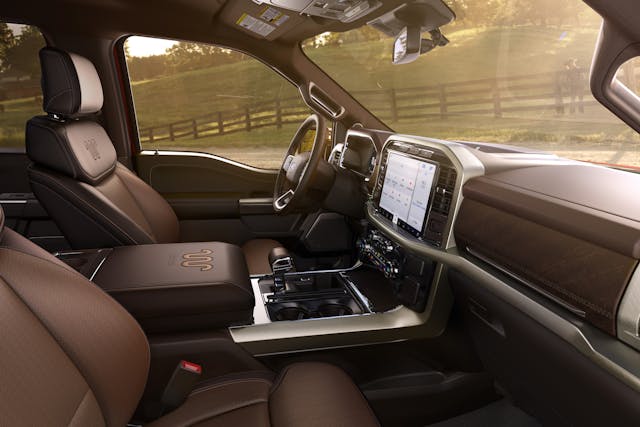
The phrase “Protestant ethic” was first used by the early 20th-century German sociologist Max Weber, but he was not the first to recognize the American society’s emphasis on the moral character of hard work. Alexis de Tocqueville marveled at the same phenomenon a century earlier. The Puritans considered economic success reflective of God’s favor. Even colonial Jamestown settler John Smith commanded: “He who will not work shall not eat.” From the very beginning, a pseudo- or openly religious glorification of labor has informed the way Americans interact with the world and each other.
The Protestant ethic is reinforced by the structure of our economy, the policy of our government, and yes, heroic national myths like the winning of the frontier. What started as Puritan religious dogma morphed into Gilded Age “bootstrap” fables, and eventually into the idealized blue-collar workers of Chevy’s “Like a Rock” ads. The ethic survives, changing with the times.

If there is one vehicle reflective of American values, it’s the trusty pickup truck. This is a machine that offers immense versatility and inherent practical value to the worker, but in the United States it has also come to represent significant value in the social hierarchy. Anyone who has felt the warm embrace of a GMC Denali interior knows that these are proper luxury vehicles—save for the badge.

Modern American culture in 2022 is much more diverse and multifaceted than it was in the 17th century, or even the early 20th, but the Puritan legacy is still evident. In many traditional circles, hard work is regarded as a fundamental moral good, while displays of wealth are considered vulgar. No matter how much money someone makes, carrying a camping pack through the woods, setting up a tent, cooking beans on a campfire, and sleeping under the stars makes people feel satisfied. Connected to nature. Blue jeans, although they were originally marketed as a uniform for miners in the California Gold Rush, have thoroughly permeated American fashion from the most basic threads to $300 raw denim.
Let’s go a step further. We’ve established that Weber’s Protestant work ethic considers labor to be a moral obligation, a commandment even. To watch the Super Bowl is to be inundated with marketing that idolizes hard work, the pickup truck its towering, mulch-hauling, stump-pulling symbol. Hard-hat-wearing miners, construction workers, and farmers treat trucks with generational reverence. Physical labor is often dirty and physically demanding, of course, though not always cinematically so. It’s a cliché, but only because it’s rooted in something real. Advertisers didn’t make it up to sell Trail Boss–emblazoned floor mats. Like independence and self-reliance, hard work—physical or otherwise—is an American value already underlying the stories many of us tell ourselves about ourselves and our country.

Consider that from our nation’s beginnings as a British colony well into the 20th century, most Americans still lived and worked in rural communities. The American economy transitioned rapidly to modern capitalism while our society was still mostly agricultural; our mainstream national values remain laced with the rugged individualism that characterized Thomas Jefferson’s ideal yeoman farmer. Today, the proportion of Americans who make their living via agriculture has never been slimmer. Truck manufacturers nevertheless still trade on the cultural pull of that figure. You may remember Ram’s “God made a farmer” commercial from back in 2013. One could argue we are now more a nation of contractors than growers, but the fact remains that tons of people still do serious physical labor, and they rely on their pickups—even the luxury models—to make their living.
https://www.youtube.com/watch?v=AMpZ0TGjbWE&ab_channel=RamTrucks
***
“Wait a minute,” you’re probably asking, “I get why people want trucks, but not why they’re willing to pay Mercedes-Benz prices for them.” Ah, but Weber has more to add on that subject:
“[The Puritans] did not wish to impose mortification on the man of wealth, but the use of his means for necessary and practical things.”
This is the crux of it. A truck is an infinitely practical device for work, and therefore, the ethic tells us, worth paying for. Even if a four-door pickup truck is primarily used for passengers, groceries, and sports equipment, it can do something a Lexus RX can’t: haul a sheet of plywood or tow a 25-foot cabin cruiser on a moment’s notice.
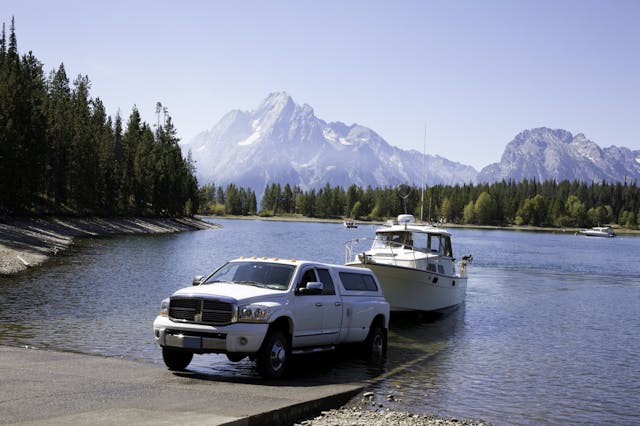
Conversely, high-trim American trucks are some of the most luxurious and stately vehicles on the road. (Not to mention how well they’re engineered.) Comfort features are often generous, and GM’s CornerStep bumpers, Ram and GMC’s multifunction tailgates, and Ford’s Pro Power Onboard electrical system combine technology and convenience in an everyday-usable package. Saving the day in a power outage, pulling a car out of a ditch, or hauling a new refrigerator from Lowe’s might not happen every single day, but the Protestant ethic puts a lot of value in even the potential for practicality. When the need arises, renting a truck from a company or calling up a friend … just hits different.
Finally, we return to the text on the tailgate. Think back again to Lincoln’s Blackwood (2002) and Mark LT (2006–2008). Ford Motor Company moved just 36,187 Lincoln Mark LTs between 2005 and 2009, against 796,039 F-Series trucks in 2006 alone. One can easily imagine that of nearly 800,000 Ford trucks sold, more than 36,000 were optioned highly enough to at least match the price of the Mark LT.
The reason people won’t accept a Lincoln truck is the same reason VW knows it will never figure out how to sell the Amarok in America, and why Mercedes never even tried with the short-lived X-Class.
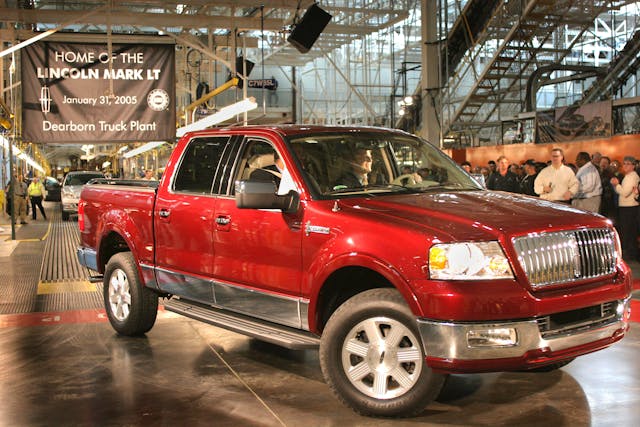
Weber again:
“[To the Puritans], irrational use [of wealth] was exemplified in the outward forms of luxury which their code condemned … this worldly Protestant asceticism … acted powerfully against the spontaneous enjoyment of possessions.”
Dominant historical American values disapprove of outward forms of luxury. Outward luxuries, that is. But when it comes to inward luxuries, like the “Heated and Ventilated Leather Front Bucket Seats with Active Motion” available on the 2022 F-150 Platinum, that’s another story. As long it has a bed, wears a Ford badge on the hood, and looks enough like the base model, it might as well be the Waldorf Astoria inside. A luxury truck is a rational purchase so long as it stays a Ford, Ram, Chevy, or even a GMC. An Escalade EXT pickup? Well, that’s just showing off.
As a non-truck-owning amateur anthropologist, it is my duty to point out that every single vehicle purchase is influenced by cultural and social forces—conscious or otherwise. This isn’t inherently good or bad, it’s just reality. Our culture in America today is diverse, nuanced, and at times contradictory. Certain aspects of it are inescapable.

The Ford Maverick, a four-cylinder unibody minitruck sales phenom, suggests that the social forces driving Americans towards trucks aren’t limited to full-sizers. And despite the hate they sometimes get from truck purists, the Rivian R1T, Ford F-150 Lightning, and Chevrolet Silverado EV are being met with considerable demand. Which tells us that the values people associate with pickup trucks are not inextricably linked to internal combustion.
Detractors will contest that the current crop of full-size trucks isn’t great for pedestrian safety, the atmosphere, or urban street parking. Proponents will fire back that no vehicle meets their various needs so effectively and reliably, and people who don’t understand that probably never will. The debate is so interesting and persistent perhaps because it is a larger societal conversation in miniature—the long-dominant Protestant work ethic being poked at, examined, and weighed against other perspectives. Such scrutiny is a common enough social phenomenon, historically speaking.
For my part, I think there is nothing fundamentally wrong with desiring a high-end vehicle if you can afford it, or a vehicle with extraordinary utilitarian potential for those moments you need it, be that once a week or once a year. Dropping Macan money on a Silverado doesn’t make a whole lot of sense to me personally, but the market at large thinks otherwise. Regardless, it is fascinating the way we showcase (or don’t) our ideas about work and luxury in the vehicles we drive.
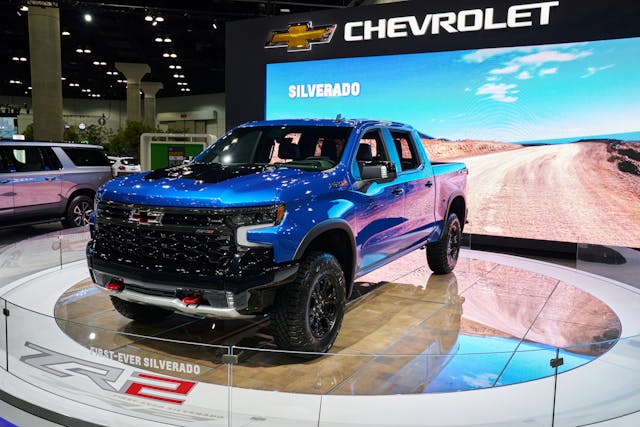
Check out the Hagerty Media homepage so you don’t miss a single story, or better yet, bookmark it.
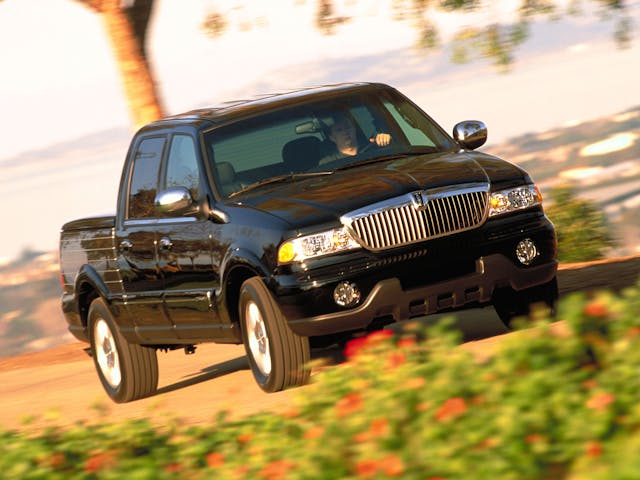


I have owned two full-size Chevy trucks. 2003 Silverado 2500 HD 4 x 4 was purchased after my Trans Am was totaled in a rear end accident. I drove it through that next winter as a daily driver and commuter then realize how safe & comfortable it was. I got better at backing into parking spots, truck has 200000 miles on it with only minor repairs. When I was a kid station wagons did this type of duty.
Let’s boil it down to the real reason.
Truck popularity is mainly because they are still considered masculine, and cars generally speaking are considered feminine. This is the real crux of the matter. Women can adopt male styles, men won’t do the opposite.
I bought a used 2016 High Country 1500 because I needed more seats for the grandkids. My 3/4 ton chevy van didn’t have the seats and at 271,000 miles it was time to move up. The High Country is far quieter than my 300C, is more comfortable, and gets 17-19 in town and 22-24 on the highway running 70-80 mph. Best 3-ton work truck I have ever owned.
Great article. It is certainly an interesting take on the phenomenon of luxury pickups that I had not considered before.
I have personally never owned a full-size pickup. Mainly because I just don’t have a need for one. I prefer mid-sized pickups. If for no other reason than the ease of parking them in a lot more places than you can fit a big truck. There is also a slight increase in fuel mileage associated with my 4.0L six. I bought my 2011 (4WD/6 cylinder/6-speed manual) Nissan Frontier new in October of 2010. There’s now around 200k miles on it and I’ve had to do virtually no major repairs. Just a couple rear axle seals, a crank sensor and a couple cam sensors. The 6′ bed easily hauls my Sportster (with the tailgate down), or a full scoop of mulch, or any of the camping gear I have ever needed to carry, my quad and anything I’ve needed to haul home from a couple hundred Home Depot / Lowes trips over the years. On the rare occasion where an 8′ bed would come in handy, I just hook up my 5’x8′ utility trailer. Speaking of towing – it has a 6,000+ lb towing capacity, so has easily pulled many a hotrod and/or sportscar. I really haven’t needed to pull heavier loads than that, so again – no need for a full size for me. Since it is now 12 years old, I may need to replace it before too much longer, but I don’t think anybody makes a manual tranny pickup right now. (although I’ve heard rumors that the ’23 or ’24 Frontier will once again offer one…) I’m not putting down full-size trucks by any means – they are super useful tools. Just not necessarily to me!
To my way of thinking, a Pickup Truck is the equivalent of a Cowboy’s Horse.
Now a hard working Cowhand or Farmer would never want to be riding the range on a showy number like a Kentucky Trotter. Nope, give them a hard working Quarter Horse any day of the week.
Do you think a Cowboy (or any Cowboy Wana be) would be out there on the prairie (or on asphalt) driving a Lincoln or a Silverado…?
I used to have an 80’s Dodge pickup that was ex-forest service. It was as bare as you could get a truck. Open the hood and all you saw was an engine. No power steering, no air conditioning, no radio, rubber floor covering, bench seat (no leather). If you want a real mans truck that was it. I grew up on a farm and we knew the difference between faking it and a real work truck. I drive a newer Subaru Outback and it will haul everything I need, get me through the snow and up forest service roads. Plus, it doesn’t eat me out of money for gas.
I’m sure that none of the truck owners will agree, but one of my friends commented that “the bigger the truck, the smaller the owner’s male appendage”.
Please don’t shoot the messenger. And I realize that it doesn’t apply to female owners, unless it’s wishful thinking on their part.
I find it hilarious that in the USA the first thing that comes to some guys mind after seeing a Pick-Up Truck is an image of the owners penis/scrotum. What a bunch of weirdos! That somehow driving a low optioned vehicle somehow makes you more of a man, it just means you can’t afford better. People who work in physically demanding jobs usually do it for one of two reasons. 1. They like to use their hands and or the idea of being cooped up in an office is repulsive. 2. Their lack of IQ won’t allow them to earn a paycheck with their minds. When I need a pick-up I drive my 20 year old Dodge Dakota. Let your imaginations run wild, weirdos.
I think Lincoln made a bad move with their “luxury” truck. Timing was off and it was not really sufficiently better to make anybody want it. Today the idea isn’t a big deal as people spend way too much on them now.
Nice to see this kind of sophisticated writing in a magazine for car enthusiasts–Hagerty has really been setting itself apart by refusing to talk down to its readers. Although I think this is a pretty unusual group of readers!
I live in the mountains of Montana where almost every other vehicle is a Ford/Chevy/Dodge truck. For sure, they come in handy when the snow is deep and the road is steep. But I think the author’s right that a lot of it’s about image rather than reality or even utility. We don’t have truck, but we do have a Toyota Highlander. Except in a handful of situations, a full-size SUV is more useful than a truck. Not only can it seat eight, with the seats down you can carry most things in the back–and without having to shovel out the snow that filled up your pick up bed overnight. (Not to mention that you can protect or lock up whatever’s in the bed from the weather.) What can’t fit in the back can often be tied to the roof rack. We’ve moved lots of 4×8 plywood that way. Once my son bought a big old pump organ we had to get home: less than $20 bucks to U-Haul for an open trailer, problem solved. If you tow really big trailers/boats/etc. a lot or need an open bed to transport the bloody elk you just shot, well OK. But 95% of the time an SUV has been more versatile for us.
But I’m surprised no one in this audience of car enthusiasts has mentioned the REALLY big downside for both trucks and SUVs. They are zero fun to drive. Yes, comfortable–but that is pretty much the opposite of fun to drive, which is about feedback from the road, crisp handling, rowing through a manual gearbox, etc. It’s about connection, not insulation. I guess people drive these big trucks to reflect their respect for (or reality of) the experience of manual work, yet the luxury trucks are all about insulating the driver from the actual experience of driving. Taking away the “work,” if you will. Seems a bit backwards.
True, for a long road trip I’d take the Highlander. And it handles surprisingly well for a 4500 pound vehicle. But the laws of physics dictate that it will never turn as sharply as my 1400-pound Spitfire. One of the creators of the Miata once defined the classic sports car as a vehicle that is pared down to the essentials need to maximize acceleration, speed, handling–in a word, driving.
And if we want to talk about what kind of car really epitomizes “manliness,” I’d take Juan Fangio’s 300SLR or Dick Hawthorn’s Jaguar D type any day of the week. Of course, these days many so-called “sports cars” are almost as heavy and overstuffed as an Escalade. But for sheer driving pleasure, I’d take my Spitfire over any truck or SUV on the road–at least until she (and I) end up crushed under one like a bug…but that’s a different topic!
That goes to my question, just why are they so big? A few comments in here about crashes that have totalled cars. I shouldn’t matter who is a fault, but I don’t recall that in the Protestant work ethic. And why are they designed intentionally to look as huge as possible. Most of them look like mini Macks. I understand there is very little you can do with style in a 3 box design when there is a bed involved, but the sense of style is that of brutalism.
And still they will sell thousands.
Yes, zero fun to drive. You’ve nailed it. I’ve owned lots of full sized pickups and SUVs as well as small pickups and SUVs. Almost all had no character. Boring. Some of the engines in them are brilliant, true. But you don’t drive an engine. Small pickups now, the most basic 2WD shorties, they can feel like old school sports cars and are a laugh to drive (which is why 2-door Wranglers are such a hoot).
A late model Ram might be the exception to the no-fun big pickup label other than feeling BIG from the cockpit. For an SUV exception I stumbled on an example; a first generation Porsche Cayenne. On a whim this spring I took a 100,000 mile Turbo S at a used car lot on a test drive and within a couple of blocks knew that it was something special. Just a wonderful driving vehicle, better than most any performance sedan I’ve owned, just full of character and competence while being comfortable, rugged and solidly built. I bought it then and there. Oh, and it’s rated to tow 7700 pounds.
I use my Dodge Caravan to haul 4×8 sheets, 10′ lumber, and all our gear, kids and dogs to the lake each week, in any weather in comfort, plus tow my boat and trailers. I can’t live without it. I also have a 2004 Chev SSR with big tires, loud exhaust, and ghost flames to satisfy my macho urges.
Jack, well done.
I have a very old truck, it will be 43 years old this year and runs very well. It is a 4 speed, no Power Steering,
everybody in the family uses it. When I have the use for the truck, it”s a Japanese 80s version, it does the
job. I can afford a new truck but I can’t justify the prices I see, and frankly I think the grille designs are atrocious. Not a reason not to buy one. It may happen if we decide to move, a subject under discussion at the
moment.
Ha[[y Holidays to everyone.
I work in manufacturing and can confirm that the illogical thought process is very strong. As an owner, I can drive a $100,000 trailer queen of a pick-up and my employees will admire the vehicle. If I drove a 5 year old Mercedes, or BMW costing a third of that number, they’d view me in a much harsher light.
Agreed Rich, I would offer this is true in most light blue collar industries…. It’s almost abnormal if you don’t have a pickup.
I’ve often wondered if it is because they can’t imagine why someone would drive anything else, or there is some distortion of perceived value as the article suggests.
Excellent article !
Excellent and entertaining piece! One cannot have too many comfortable pickups. I will never part with my two Ram Cummins nor my ’66 El Camino.
If I didn’t have my enclosed car hauler to pull around, I’d drive a Challenger! Then again, I had a Magnum, loved that wagon, except in the snow.
I’ve always had a truck. Mostly Fords because I got a discount. Never had a Dodge yet. I bought a ZR2
Colorado in 2019 and love it. Yes, not much of a bed for plywood etc. but I have a trailer for that. I’ve had
GMC Gouchos and Chev Caminos, Ford Explorer Sports, all good vehicles. If you want a work truck, buy a work model. If you want a vehicle for pulling a boat, travel trailer, skidoo, etc buy it. Depends on your needs.